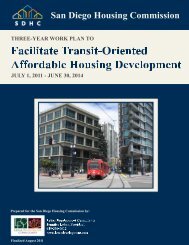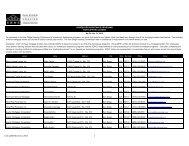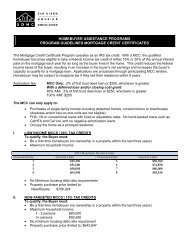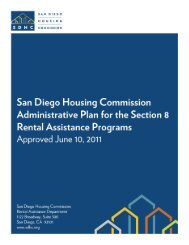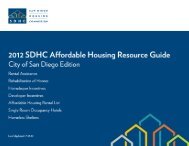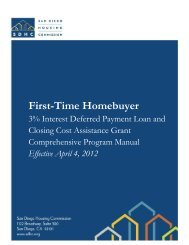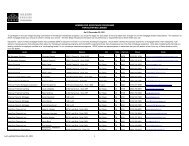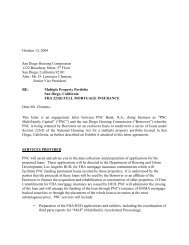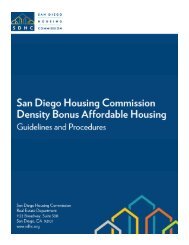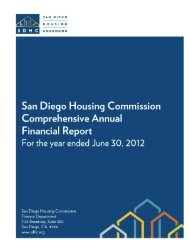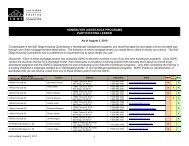Chapter 1 - San Diego Housing Commission
Chapter 1 - San Diego Housing Commission
Chapter 1 - San Diego Housing Commission
Create successful ePaper yourself
Turn your PDF publications into a flip-book with our unique Google optimized e-Paper software.
<strong>Chapter</strong> 11 – Program Terminations and Program Integrity Unit<br />
[24 CFR Part 982, Subpart B, G, I & K]<br />
3. Definition of Preponderance of Evidence<br />
Preponderance of evidence is defined as evidence which is of greater weight or more convincing<br />
than the evidence which is offered in opposition to it; that is, evidence which as a whole shows that<br />
the fact sought to be proved is more probable than not.<br />
With respect to burden of proof in civil actions, this means the greater weight of evidence, or<br />
evidence that is more credible and convincing to the mind; that which best accords with reason and<br />
probability.<br />
Preponderance of evidence may not be determined by the number of witnesses, but by the greater<br />
weight of all evidence, the opportunity for knowledge and the information possessed.<br />
Note: The word "preponderance" means something more than "weight"; it denotes a superiority of<br />
weight, or outweighing.<br />
4. Credible Evidence<br />
Credible evidence can be provided by such sources as police, the court system and SDHC staff.<br />
Testimony from neighbors, when combined with other credible evidence, can be used to determine<br />
whether a preponderance of evidence exists.<br />
DD. HEARING DECISIONS<br />
The hearing decision shall be based exclusively on the evidence and other material introduced at the<br />
hearing and which shall comply with governing law, regulations and SDHC policies. Factual<br />
determinations relating to the individual circumstances of the family shall be based on a preponderance<br />
of the evidence presented at the hearing (24 CFR 982.555). A hearing decision shall be rendered which<br />
will either uphold or reverse the intended action of SDHC.<br />
The Hearing Officer shall not allow the participant or SDHC any additional time to provide information or<br />
evidence to support the participant's case. The Hearing Officer will issue a written decision to SDHC and<br />
participant no later than 20 workdays following the hearing except those hearings regarding eligible<br />
immigration status; in which case the decision will be issued within 14 days.<br />
The hearing decision shall summarize the facts, identify each issue considered, specify the reasons for<br />
the decision on each issue and identify the supporting evidence, laws, regulations, and SDHC policies<br />
upon which the decisions are made.<br />
The Hearing Officer must decide:<br />
- Whether SDHC correctly applied the program rules, regulations or SDHC policies in the action<br />
outlined in the NIA; or<br />
- Whether the participant did or did not violate a program regulation, law or policy.<br />
When the hearing decision is unfavorable to the participant, it shall advise the participant of the<br />
following:<br />
- The participant's right to obtain judicial review of the decision under California Code of Civil<br />
Procedure 1094.6 if a petition therefore is filed within 1 year of the date of the decision.<br />
- That the hearing decision shall be final and binding upon all parties unless timely judicial review is<br />
sought by either party.<br />
11-19



